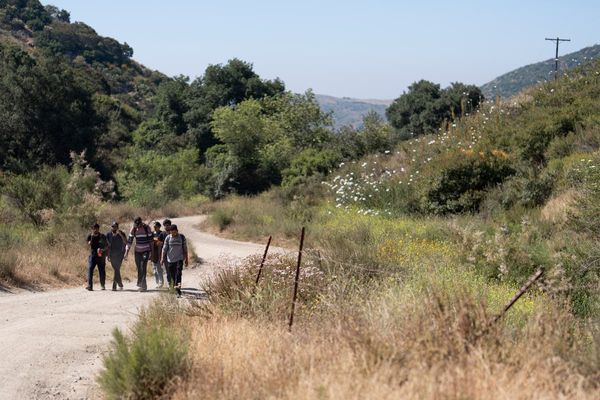
A white-tailed eagle chick has hatched in England for the first time in more than 240 years, and conservationists are “utterly elated” by the new arrival.
White-tailed eagles were once widespread across England but were widely persecuted by humans, and the last record of a pair breeding was in 1780. Since 2019, 25 of these eagles, which are Britain’s biggest bird of prey, have been released to the Isle of Wight as part of an effort to bring back long-lost species.
The male chick is the first offspring from that initial release. He is 12 weeks old and left the nest last week, although he will stay close to home and be fed by his parents for the next few months. The location of the nest has not been revealed to prevent disturbance.
Steve Egerton-Read, a project officer for Forestry England, spotted the chick through his binoculars while standing in a neighbouring field. “We were utterly elated and gobsmacked,” he said. “I’ve known there was a nest there for a long time and I still don’t quite believe it’s happened.”
White-tailed eagles, which have a wingspan of 2.4 metres (8ft), usually do not start breeding until they are four or five years old, and this pair are only three. They are the first to breed out of three pairs that have established territories in southern England.

The release is licensed by Natural England, the government’s wildlife agency. It follows a successful reintroduction programme in the Scottish Highlands, where white-tailed eagles started to be released in the 1970s after chicks were taken from Norway. There are now more than 150 pairs in Scotland.
The reintroduction programme, led by Forestry England and the Roy Dennis Wildlife Foundation, involved moving birds south. The female of the pair was originally from the Outer Hebrides and the male from north-west Sutherland. More releases are planned this summer on the Isle of Wight.
The birds are often called sea eagles because a huge part of their diet is fish. The Isle of Wight was chosen because the Solent offers plenty of food, as well as an abundance of cliffs and woodlands, providing potential nesting and resting sites. The birds have been spotted widely in England, from Cornwall to the Norfolk coast, and have even made forays across the Channel.
The chick has been ringed and fitted with a GPS tag so ornithologists can track its progress.
Roy Dennis, the founder of the eponymous wildlife foundation, described the development as a “significant milestone”. He said: “This is a very special moment for everyone who has worked on, supported and followed this groundbreaking project. Restoring a breeding population in southern England, where the species was once widespread, has been our ultimate goal. Many thought it was impossible but we knew food for eagles – fresh- and saltwater fish, cuttlefish, rabbits, hares and wild birds – was plentiful.”
Conservationists are concerned about sea eagles being illegally targeted because of the perceived threat to the livelihoods of farmers and game shooting. Two of the eagles from the 2019 release programme were found dead after being poisoned, police said in March. Out of the 25 birds released, 16 are still alive.
A 2022 project to reintroduce the birds to the Norfolk coast was put on hold last autumn owing to opposition from farmers, shooting interests, and conservationists worried they would predate on wading birds, sources told the Guardian.
Dennis said: “We still have a long way to go but the feeling of seeing the first pair reach this stage is truly incredible.”







